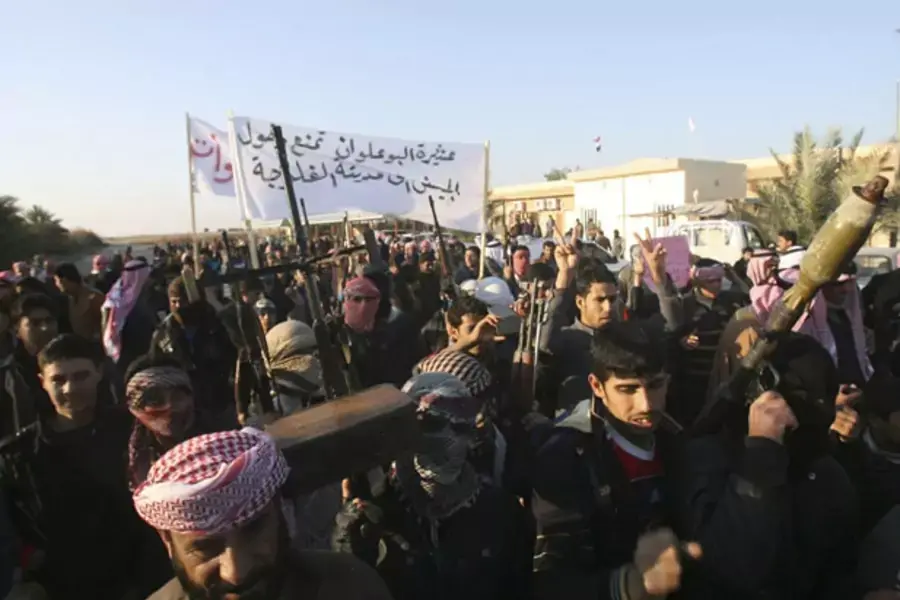The World Next Week: Al Qaeda Resurfaces in Iraq, Egyptians Vote on a Constitution, and Thais Protest Ahead of Elections

The World Next Week podcast is up. Bob McMahon and I discussed ongoing violence in Iraq’s Anbar province, Egypt’s constitutional referendum, and anti-government protests in Thailand.
[audio: http://www.cfr.org/content/publications/media/editorial/2013/20140109_T…]
The highlights:
- The Iraqi government of Prime Minister Nouri al-Maliki is weighing how to oust al-Qaeda militants who seized control of Fallujah and parts of Ramadi in the Sunni-dominated Anbar province. The uprising reflected both Maliki’s failure to bridge the gap between Sunnis and Shia in Iraq and the spillover from the war being fought in neighboring Syria. Most Sunnis in Anbar oppose the al-Qaeda militants, many of whom have been fighting in Syria, but they are also deeply alienated from Maliki’s Shia-dominated government in Baghdad. Unless Maliki can find a way to bridge the sectarian divide and rebuild working relations with Sunni tribal elders, the odds are good that Sunni-Shia violence in Iraq, and possibly elsewhere in the region, will grow.
- Egyptians go to the polls next week to vote in a referendum on a new constitution. The new document looks a lot like the one that the Muslim Brotherhood enacted two years ago with two major differences: provisions strengthening the role of the army and police have been added, and provisions favoring Islamists have been dropped. The new constitution is likely to pass, but it won’t end Egypt’s political or economic crises anytime soon. A low-level insurgency has been simmering in the Sinai, and an economic turnaround will require political stability and a willingness to enact painful economic reforms that has so far been lacking.
- Thailand’s Democratic Party says it intends to turn Thais out in force next week to “Occupy Bangkok” in a bid to force Prime Minister Yingluck Shinawatra out of office. Yingluck is the sister of exiled former prime minister Thaksin Shinawatra, who was ousted in a military coup in 2006. Her critics argue that she does her brother’s bidding and that her Puea Thai Party has allowed corruption to flourish. Thailand’s political divide reflects regional and class distinctions that divide Thai society. The Democratic Party is strong in Bangkok and among middle- and upper-class voters; Puea Thai draws its strength from the rural poor from northern and northeastern Thailand who have historically been on the fringes of Thai politics. Thai voters go to the polls on February 2. If the vote goes off as scheduled, the next question will be whether the losing party is willing to live with the results.
- Bob’s Figure of the Week is 142 million. My Figure of the Week is Recep Tayyip Erdogan. Our audience-nominated Figure of the Week comes from TWNW listener @novenagates who picked Shinzo Abe. As always, you’ll have to listen to the podcast to find out why.
For more on the topics we discussed in the podcast check out:
Violence in Iraq: Max Boot and Ned Parker discuss the current situation in Iraq and what can be done about it. Max Boot also explains how al-Qaeda terrorized its way back in Iraq. The New York Times writes that the war in Iraq did not end when the United States withdrew. Al-Jazeera reports on the deal struck between the Iraqi military and tribal leaders to fight Al-Qaeda militants.
Egyptian Referendum: The Wall Street Journal describes the “odd partnership” between the Islamist Party and secularist liberals to support the constitution. CBS News reports on clashes last week between police and Muslim Brotherhood supporters. Steven Cook analyzes the current situation in Egypt. Al-Jazeera writes about Egyptians living abroad who will vote in the referendum.
Thai Protests: The New York Times analyzes political divisions in Thailand. UPI discusses the protesters’ plans to shut down Bangkok. Reuters reports on economic concerns exacerbated by the protests. Josh Kurlantzick writes about the amnesty bill that sparked protests and asks if Thailand can move forward in 2014.
 Online Store
Online Store
